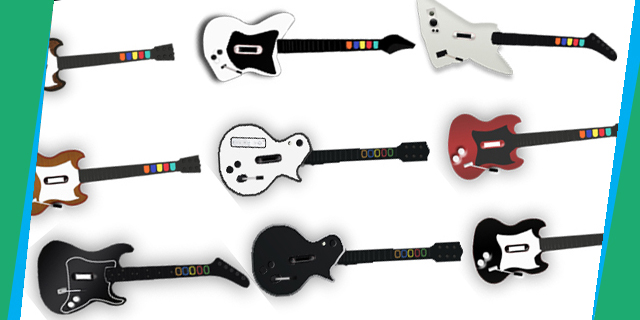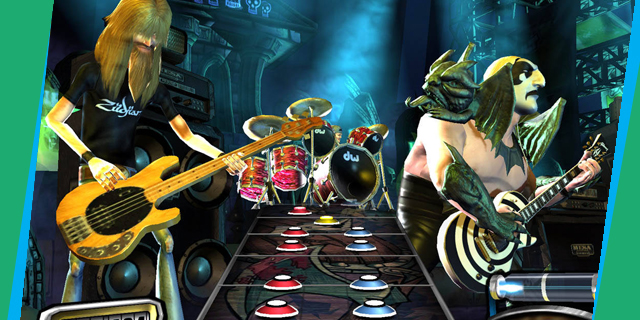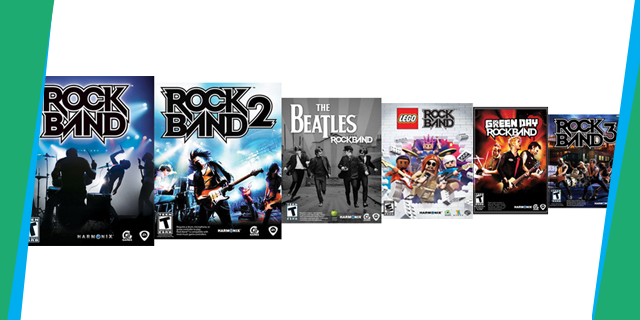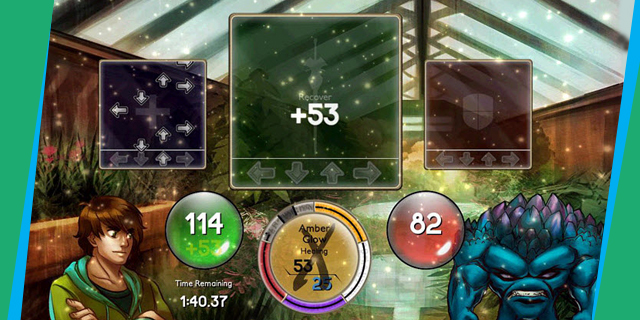
When we left off in part one, the turn of the century found the rhythm/music genre enjoying moderate success. The games were fun, fresh, and innovative; we were happy campers at this point. But who do I mean by “we”? At that given time, it would have been the explorers: the hardcore, the niche. With the exception of big-name games like Dance Dance Revolution and Parappa the Rapper, most rhythm/music games were still obscure. Gitaroo who? Bust a what? Casual players were still ignorant of the speeding freight train that was about to blindside them.
Dynasties are born (2005-2007)
Let’s get this out of the way immediately: Guitar Hero was not completely innovative. Arcade goers had been playing Konami’s Guitar Freaks way before Guitar Hero graced the PS2 in 2005. Regardless, its release on consoles was a pivotal moment for music games. Beatmania had its own dedicated console crowd, but it never really took off outside of Japan. Guitar Hero on the other hand had much wider appeal. With licensed music from artists all across the board, there was something for everyone. The peripheral included with the game was fresh at the time; it made players feel like they were playing more than just a game, they were having an experience. And the best was yet to come.
Guitar Hero II (2006) is still revered as one of the best of the series by critics and fans alike. This game was no sophomore slump: with a larger track list, improved multiplayer and a practice mode, it was destined for stardom. But the real catch here is that Guitar Hero II made it to multiple platforms, bringing the experience to a wider audience. (Dance Dance Revolution had seen similar success in the past, but the game’s focus on dance music limited its allure).

Following Guitar Hero II’s success, Activision was quick to snatch up publisher RedOctane in 2007, with Viacom subsequently purchasing developer Harmonix. Before Harmonix was free, though, they had to pump out the first of what would be many spin-off Guitar Hero games: Guitar Hero Encore: Rocks the 80s. This disc felt more like add-on content than a full game, much like Sony’s Singstar series.
The next flagship title in the Guitar Hero series would Guitar Hero III: Legends of Rock (2007), developed by Neversoft. The game received positive reviews, but by this point the formula was becoming trite. Luckily, the minds over at Harmonix had bigger plans. In November 2007, the studio released Rock Band to critical acclaim. Combining karaoke with Guitar Hero and adding in drums, this was the ultimate multiplayer experience. With so many roles to play, each song was a fresh experience time and time again. On top of that, Harmonix released new songs as downloadable content weekly, adding new genres to keep the game from becoming stale. The majority of these tracks (and Guitar Hero III’s) were master recordings too, adding icing to the already-sweet cake.
Reaching the crest and then the decline (2008-2010)
Not wanting to fall behind, Activision released Guitar Hero: World Tour in 2008, complete with its own set of instruments, but by that point it was too late to catch the flight. Rock Band 2 saw release the same quarter, and since it was in its second iteration, had more time to tweak its flaws. Rock Band 2 also let gamers import the majority of the songs from the first disc, thus keeping what was old relevant. This did not stop the Guitar Hero series from finding success through name alone though. There was a third competitor in town: Konami’s highly-inferior Rock Revolution, based on that same old Guitar Freaks series and in many ways crippled by its adherence to that formula. The market had always been crowded with wannabes and look-alikes, but never at this magnitude.
Now with three different “band” games on the market, a multitude of Dance Dance Revolution rip-offs and more karaoke games than you can shake a stick at, players were starting to lose interest. The genre was stagnating. That’s not to say there weren’t rhythmical gems still being released in between all the stinkers. Rhythm Heaven was a godsend for Nintendo DS users who hadn’t seen an original rhythm game since Elite Beat Agents (Sorry Ontamamarama, you tried). DJ Hero brought new ideas to the genre, but failed to perform well on the market. Dance Central taught gamers how to really groove with its intuitive motion-based controls. There was even a resurrection of Frequency for PSP, in the form of Rock Band Unplugged.

The now-annual releases of Guitar Hero and Rock Band were still fun, but their innovations were lacking. The Beatles: Rock Band was fantastic if you like The Beatles, but then they went ahead with the Lego Rock Band idea in the same quarter, adding competition for their own brand. If that is not a clear enough example of oversaturation, I don’t know what to tell you.
Harmonix tried to salvage the mess they made. Rock Band 3 added keyboards and an actual guitar peripheral, but users were played out. The genre was a sinking ship, and it was time to bail. Games had gotten all the more realistic, but the jumps weren’t large enough. The fad was over.
The silence is deafening (2011 to present)
2011 saw the release of a couple of rhythm/music games, but there were no big name ones (besides Dance Central 2, which was a large improvement over the original). Rocksmith came out about two years too late to make waves. Indie game Sequence snuck from XBLIG to PC last fall and pleased those of us who needed to scratch our rhythm game itch, but other than that it was fairly barren. 2012 has started out much the same, with the only high profile release thus far being Rhythm Heaven Fever, yet everything feels perfect at this exact moment. The games we’re being fed are quality again; their infrequent release leaves us sated but hardly hungry.

Saturation is an inevitable thing, with the market for video games growing every day. Ultimately every genre goes through this transition. Just look at platformers: their golden age has long since passed, but they are beginning to wriggle their way back into the hearts of gamers once more with traditional games like Donkey Kong Country Returns and Rayman Origins. I predict that the fighter genre will be the next one to find its self teetering on the edge (a second time): there are so many exciting releases coming out this year, but will the next be better than the last? It’s a cycle that is bound to continue from generation to generation, as what’s old will be new again given enough time.



















